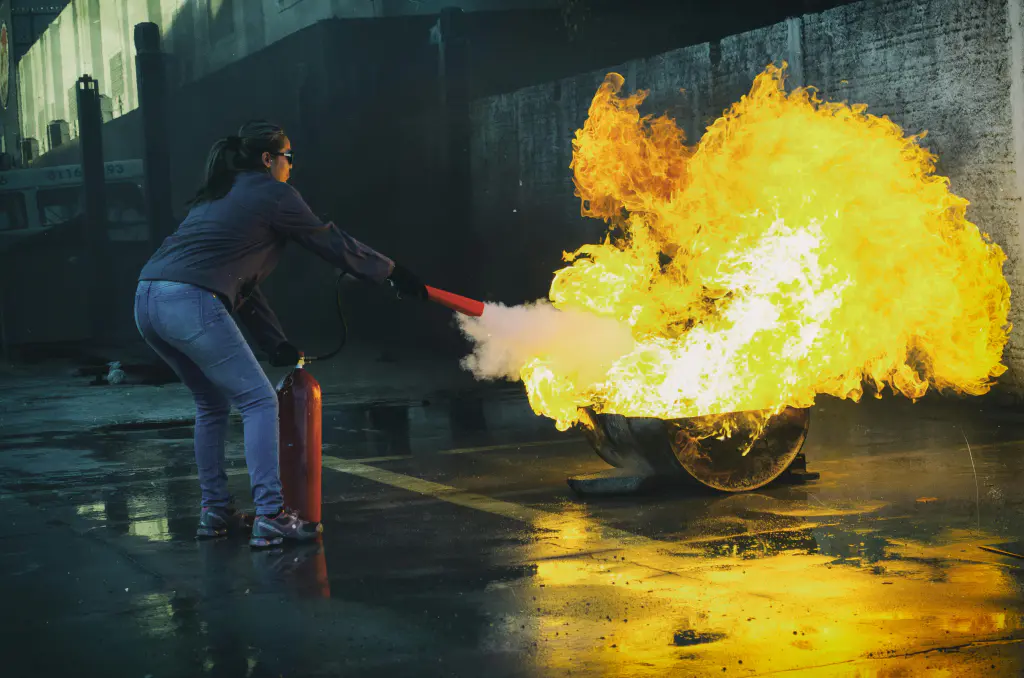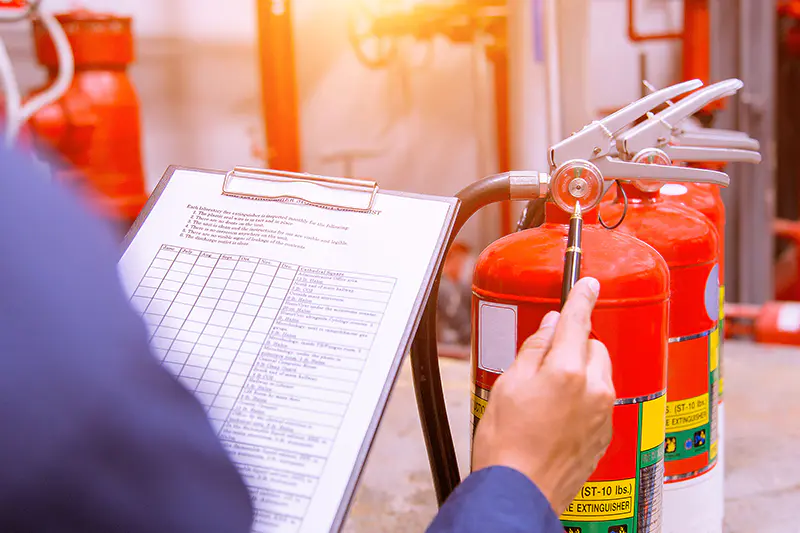As the saying goes, ‘finding a needle in a haystack,’ locating a reliable fire risk assessor amidst a sea of options can be a daunting task. The stakes are high when it comes to fire safety, and the right assessor can be the linchpin in ensuring a secure environment.
It’s imperative to understand the key factors that set apart a competent assessor from the rest. So, let’s unravel the essential aspects to consider when entrusting this critical responsibility to a fire risk assessor.

Understanding Fire Risk Assessments
Understanding fire risk assessments is crucial for ensuring the safety and compliance of non-private dwellings. When conducting assessments, various techniques are utilized to evaluate fire risks comprehensively. It’s imperative to adhere to legal requirements during the assessment process to guarantee regulatory compliance.
Assessors must possess the necessary training to effectively identify potential fire hazards and assess the overall safety of a building. The complexity of the building being assessed plays a significant role in determining the level of expertise required from the assessor. Simple premises may be handled by employees with proper guidance, while more intricate structures demand highly knowledgeable and experienced assessors.
Expertise levels must align with the intricacy of the building to ensure a thorough evaluation. Therefore, assessors must continuously enhance their understanding of assessment techniques, legal obligations, and building complexities to effectively mitigate fire risks and ensure the safety of occupants.
Assessor’s Competency Criteria
Competency criteria for fire risk assessors are established by the Fire Risk Assessment Competency Council (FRACC) to ensure assessments meet legal requirements. Assessors must possess assessing experience, meet specific training requirements, have thorough legal knowledge, undergo expertise checks, and pass competency verifications.
| Criteria | Description |
|---|---|
| Assessing Experience | Assessors must have practical experience in conducting fire risk assessments. |
| Training Requirements | Completion of relevant training programs in fire safety and risk assessment. |
| Legal Knowledge | Comprehensive understanding of fire safety laws and regulations is crucial. |
| Expertise Check | Assessors must demonstrate expertise in handling various types of buildings. |
Meeting these criteria is essential to guarantee that fire risk assessments are conducted competently and in accordance with legal standards. Building owners should ensure assessors meet these qualifications to trust in the accuracy and reliability of the assessment process.
Deciphering Competency Requirements
Deciphering the requirements for assessor competency involves a thorough examination of assessing experience, training qualifications, legal knowledge, and expertise verification. Assessing expertise is paramount, necessitating a deep understanding of fire safety practices and laws.
Training essentials are crucial for competency, with assessors needing to stay updated on regulations and best practices. Experience evaluation is key, especially for handling complex buildings where seasoned assessors excel.
Additionally, knowledge assessment is fundamental, requiring a comprehensive understanding of fire safety laws and practices to ensure assessments meet legal requirements. Seeking guidance when necessary is vital, especially for new assessors or when dealing with intricate structures.
Qualifications for Fire Assessors

To become a qualified fire risk assessor, one must possess a thorough understanding of relevant fire safety practices and regulations. Training requirements encompass knowledge of fire safety laws and the ability to conduct comprehensive assessments. Legal knowledge is crucial as assessors must ensure compliance with regulations.
Experience is essential, especially for handling assessments in complex buildings where expertise is paramount. Seeking external assistance, such as additional training for new assessors, can aid in meeting competency criteria.
Fire safety is the cornerstone of this role, necessitating a deep understanding of preventive measures and emergency protocols. Continuous learning and a willingness to seek guidance when needed are vital for maintaining proficiency. Therefore, a blend of theoretical knowledge, practical experience, and a proactive approach to staying informed are key components in becoming a proficient fire risk assessor.
Exploring External Support Options
Qualified fire risk assessment companies provide valuable external support for ensuring fire assessments meet legal requirements. When considering external support options, the hiring process should involve selecting a company with a proven track record in adhering to industry standards and certification requirements. Outsourcing benefits include tapping into the expertise of experienced professionals who can navigate complex buildings effectively. These companies can handle the entire assessment process, from initial evaluation to creating comprehensive reports that comply with regulations.
Cost considerations are crucial when exploring external support options. While there’s a financial investment involved, the peace of mind that comes with knowing assessments are conducted accurately and in line with legal requirements is invaluable. Professional companies can alleviate the burden on responsible individuals and ensure that fire risk assessments are thorough and compliant. By seeking external help, building owners can rest assured that their properties are adequately assessed for fire risks.
Frequently Asked Questions
Can a Fire Risk Assessment Be Conducted by Anyone Within a Company, or Does It Require a Specific Individual or Department to Handle It?
Handling fire risk assessments internally varies based on complexity. Simple premises may allow internal staff with guidance. However, for complex buildings, knowledgeable and experienced assessors are needed to meet legal responsibilities effectively and ensure safety.
What Are the Common Challenges or Obstacles That May Arise During a Fire Risk Assessment Process?
Identifying risks, developing mitigation strategies, ensuring compliance, enhancing emergency preparedness, and addressing training needs are common challenges during fire risk assessments. Competent assessors play a vital role in navigating these complexities effectively.
How Often Should a Fire Risk Assessment Be Reviewed and Updated to Ensure It Remains Accurate and Compliant With Regulations?
To maintain accuracy and compliance, fire risk assessments should be reviewed annually or when significant changes occur. Expert assessors with relevant qualifications ensure legal adherence, implement effective risk mitigation strategies, and develop robust emergency response plans.
Are There Any Specific Industry Standards or Best Practices That Fire Risk Assessors Should Follow When Conducting Assessments?
When conducting fire risk assessments, adherence to compliance standards, industry guidelines, and best practices is crucial. Assessors must meticulously follow the risk assessment process to ensure accuracy, meeting legal requirements while upholding safety standards.
What Are the Potential Consequences of Not Having a Proper Fire Risk Assessment in Place for a Non-Private Dwelling?
Not having a proper fire risk assessment for a non-private dwelling could lead to severe consequences like property damage, injury, or loss of life. Neglecting legal requirements for fire safety assessments puts lives and assets at risk.
Conclusion
In conclusion, selecting a competent fire risk assessor is paramount for ensuring the safety and compliance of buildings. By carefully assessing their competency against established criteria and qualifications, one can confidently choose an assessor who possesses the necessary skills and knowledge to conduct thorough assessments.
It’s essential to prioritize fire safety laws and regulations to maintain a safe environment for all occupants. Choose your fire risk assessor wisely to protect lives and properties effectively.









